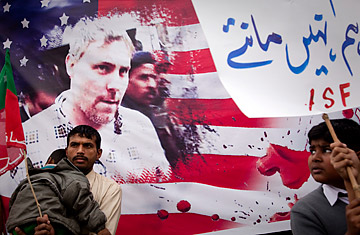
Protesters stand next to a banner bearing an image of U.S. consulate employee Raymond Davis, who shot dead two local men in Lahore, Pakistan, on Feb. 3, 2011
(2 of 3)
According to U.S. and Pakistani officials, Washington threatened to retaliate by limiting the movements of Pakistan's diplomats in the U.S. after Cameron Munter, the U.S. ambassador in Islamabad, was questioned at Islamabad airport. Munter had been traveling to Karachi on Thursday, July 28, when he was surprisingly asked by airline officials to provide a no-objection certificate. Officials said they knew of no similar demand having been made of any of Munter's predecessors.
The restrictions imposed by the Pakistani foreign office at the behest of the ISI appear to be just one element of a broader effort since the Davis affair by spy chief Lieut. General Ahmed Shuja Pasha to make his agency aware of exactly what every American official in Pakistan is working on, a U.S. official tells TIME on condition of anonymity. The Pakistani spymaster's alarm was further heightened when reports emerged that the CIA had recruited Pakistani citizens to help spy on bin Laden's hiding place in Abbottabad. The alleged harassment of U.S. personnel would clearly limit the Americans' ability to gather intelligence in Pakistan independently of the Pakistani authorities.
"The U.S.-Pakistani relationship is complicated," a U.S. official tells TIME on condition of anonymity. "It ebbs and flows, and it's driven most of all by what is or isn't accomplished on the ground. There have been recent incidents where U.S. embassy officials have been harassed by Pakistani authorities, which is a disturbing trend. The visas the Pakistanis have agreed to give U.S. embassy officials are short-term and single-entry — not the type traditionally afforded to diplomatic representatives in the country. This is a far from ideal solution."
Still, tensions appear to have been somewhat eased by a July 14 meeting in Washington between Pasha and CIA acting director Mike Morrell. At the meeting, an agreement was struck to issue 87 visas to CIA agents headed to Pakistan, reviving the strength of the station there and lifting the choke hold on new visas to U.S. officials, even aid workers, that has been in effect in recent months. The two spy chiefs also agreed on new "rules of engagement," a senior Pakistani official says.
Pasha will not have been displeased by the recent departure of the CIA's station chief in Islamabad. Relations between them are alleged by officials from both sides to have been strained by the Davis affair, and they exploded into angry exchanges following the bin Laden raid. An official familiar with ISI-CIA relations says the station chief had been forced to leave the country because of a sudden illness but was in any case scheduled to leave early, in September, after just 10 months on the job. The station chief's departure was first reported by ABC News.
